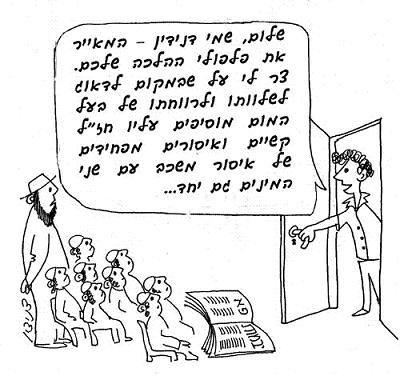
A person born with both sets of sexual organs, male and female, is called by the sages androgynous [from the Greek: andros=male, gyne=female], and it is difficult to determine the sex of this person to be either male or female. Naturally, this sort of person raised many Halachic questions; for example, is this person permitted to marry a man, or is this person permitted to marry a woman, and many other such Halachic questions based on the distinctions between men and women. One of the early sages, Rabbi Yossi, ruled that an androgynous cohen who has married a woman not of a priestly family has contracted a valid marriage and the woman may eat of the terumah as would any wife of a cohen. The scholars attempted to clarify whether an androgynous person is treated as absolutely male. According to one scholar, Reish Lakish, an androgynous person is considered questionably male, questionably female, and his marriage to a woman not of a priestly family does not permit her to eat of what is defined by Torah law as terumah, only of what is defined so by rabbinical law. A different scholar, Rabbi Yochanan, stated that an androgynous person is considered definitely male and his wife eats even of what is terumah according to the Torah’s laws.
Rabbi Yochanan asked his colleague Reish Lakish: According to your view that an androgynous person is not definitely a male, why did the early sages rule that he may marry a woman, given that it is possible he himself is female? Answer: Indeed, it is forbidden for an androgynous person to marry a woman. When the early sages said that he had married a woman, they meant that de facto, had he already married a woman, the marriage would retroactively be valid. The scholars asked about the opinion of the sage who said an androgynous person is considered definitely male, using the words of the sage R’ Elazar, who disagreed with the words of the sages and ruled that an androgynous person who had sexual relations with a man violates the prohibition against male homosexual intercourse and is liable to the death penalty by stoning. This means that according to the sages an androgynous person is not liable to stoning, so we are forced to say they do not consider him definitely male. Answer: An androgynous person is definitely male, but the disagreement between the early sages was whether an androgynous person who has sexual intercourse with a male while using the female sexual organ is liable because of having had male homosexual intercourse. According to the sages, no matter which sexual organ — male or female — was used for the relations, the androgynous person is liable for having had male homosexual intercourse, but according to R’ Elazar the androgynous person is only liable if he used his male sexual organ. According to another sage, an androgynous person is considered neither male nor female; the androgynous person is a creation onto itself and therefore may not wed either of the two other sexes. The scholars continued to explain the reason for the sages’ disagreement about whether an androgynous person who has sexual relations using his female sex organ is liable for male homosexual intercourse. It is written in the Torah: “You shall not lie with a male in the ways of lying with a woman. It is an abomination” (Leviticus 18:22). Because it uses the plural, ways of lying, the scholars said it means a man who has two ways of lying, two types of sexual intercourse. This is the androgynous person, who can have sex as a male or as a female. According to the sages only sexual intercourse using his male sex organ would make him liable for male homosexual intercourse, and they interpret the verse to mean that such a man may not have sexual relations with another man using his male sex organ, but if the androgynous person has sexual relations with a man using his female sex organ, he is not liable for male homosexual intercourse.
(Babylonian Talmud, Tractate Yevamot 81a-84a)
